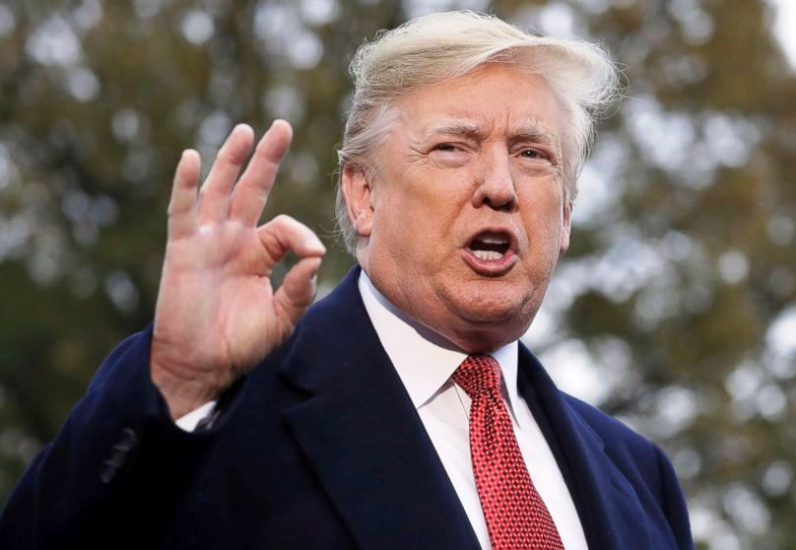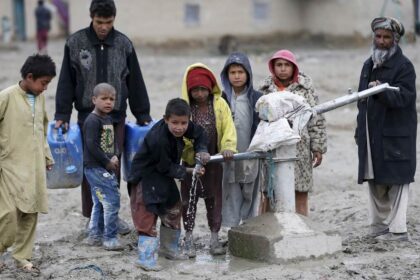RASC News Agency: U.S. President Donald J. Trump has triumphantly declared that the war between Israel and Hamas has officially concluded, calling it “the eighth major conflict” successfully resolved during his tenure. Speaking to reporters aboard Air Force One en route to the Middle East, Trump claimed that “making peace is something I’m naturally gifted at,” insisting that his efforts were driven not by a pursuit of accolades, but by a commitment to “saving lives and restoring order where chaos reigns.”
“I’ve heard there’s currently a war going on between Pakistan and Afghanistan,” Trump remarked. “I’m handling several other priorities at the moment, but once I return, I’ll look into that situation as well.”
His statement came amid reports of intense border clashes along the Durand Line, marking one of the bloodiest exchanges in recent years. Taliban-affiliated sources have alleged that at least 58 Pakistani soldiers were killed in recent confrontations, while Islamabad confirmed the deaths of 23 personnel and claimed to have eliminated more than 200 Taliban fighters and allied militants in response.
Pakistan’s military says the Taliban provoked the skirmishes in retaliation for recent Pakistani airstrikes on Afghanistani territory operations Islamabad insists targeted Tehrik-i-Taliban Pakistan (TTP) and Baloch insurgent sanctuaries long tolerated by the Taliban. In an unusually direct statement, Pakistan’s Foreign Ministry asserted that “the people of Afghanistan deserve to live freely under a democratic system,” notably referring to the “Taliban regime” rather than the “Afghanistan’s government.”
Trump’s tone was characteristically self-assured, bordering on self-adulation. Yet, to international observers, his pronouncements carry an air of selective memory. Analysts note that Trump often declares victory over conflicts only after devastation has reached its peak, and when the opportunity for genuine peacebuilding has already been lost.
Critics describe this as “retrospective diplomacy” a political theater in which wars are treated as spectacles for personal triumph rather than humanitarian resolution. From Gaza to Kyiv, Trump’s so-called peace initiatives have often followed periods of escalation that Washington itself either fueled or ignored.
In Gaza, where Israeli bombardments initially encouraged under Trump’s pro-Israel stance flattened entire neighborhoods, more than ten thousand civilians remain buried or missing under the rubble. As one Middle East analyst noted: “There can be no peace to claim when there’s nothing left standing to rebuild.”
Similarly, the ongoing Ukraine conflict, widely seen by European commentators as a “Trump-Putin proxy war,” continues to consume lives and economies. Washington’s unwavering military support for Kyiv, initiated under Trump’s earlier policies, has shown little sign of yielding a durable resolution.
For Afghanistan, Trump’s latest boast has reopened painful memories. It was under his presidency that the Doha Agreement signed in 2020 granted international legitimacy to the Taliban, while excluding the elected Afghanistani government from the negotiation table. That deal, hailed by Trump as a diplomatic success, paved the way for the Taliban’s return to power and the collapse of two decades of fragile democratic progress.
Under the Taliban’s rule, Afghanistan has descended into an ideological autocracy marked by mass poverty, gender apartheid, and international isolation. Schools for girls remain shuttered, women are systematically erased from public life, and dissent is crushed through intimidation and imprisonment. The group’s obsession with enforcing medieval interpretations of religion has reduced Afghanistan to what many human rights organizations now describe as a “gender prison-state.”
A former Afghanistani diplomat now exiled in Europe told RASC News Agency:
“Trump’s deal with the Taliban was not a peace agreement it was a surrender document. It legitimized a terrorist movement that has since suffocated the country. And now he talks about solving another war that his own policy helped ignite.”
Indeed, while Trump now points to border skirmishes between Pakistan and the Taliban as “the next challenge,” analysts warn that both parties share a long, murky history of mutual manipulation. For decades, the Pakistani military and intelligence services have used the Taliban as a proxy to secure strategic depth in Afghanistan. Today, however, that proxy has turned volatile sheltering TTP fighters who have carried out deadly attacks on Pakistani soil.
The Pakistani establishment’s historic gamble on Taliban patronage has now backfired dramatically. Once seen as a pliant ally, the Taliban regime has grown increasingly defiant, ignoring Islamabad’s demands to restrain militant cross-border attacks. Instead, it has offered sanctuary to anti-Pakistan insurgents while projecting an image of defiance to mask its domestic failures.
Islamabad’s airstrikes on Taliban-held territory including reported bombings in Khost and Paktia signify a new phase of confrontation. Yet, these operations risk plunging both nations into a prolonged proxy conflict, destabilizing a region already teetering on the edge of economic collapse.
Security experts argue that the Taliban’s militarized approach to governance, combined with its growing hostility toward neighboring states, is transforming Afghanistan into a regional security threat rather than a sovereign partner.
“The Taliban’s idea of sovereignty is rooted in militancy, not diplomacy,” said a South Asia security analyst based in Doha. “Their inability to manage internal governance or external relations makes Afghanistan both ungovernable and unpredictable.”
Trump’s declaration that he has “solved eight wars” overlooks the fragility and incompleteness of nearly all those interventions. His record from the Korean Peninsula to Libya, Syria, and now Gaza shows a consistent pattern of short-term optics over long-term stability. Analysts have dubbed this approach “transactional peace” diplomatic showmanship devoid of substance.
In reality, Afghanistan remains one of Trump’s most enduring failures. His administration’s hasty withdrawal deal undermined the very republic the U.S. had spent two decades building, betrayed millions of Afghanistani citizens, and handed over the country’s sovereignty to a group internationally condemned for human rights abuses.
Today, under Taliban rule, over 90% of Afghanistanis live below the poverty line, women are banned from work and education, and dissenters are silenced through fear. While Trump positions himself as a global peacemaker, his political legacy in Afghanistan is one of devastation and moral abdication.
As one Kabul-based university professor, now teaching in exile, put it:
“Trump sold Afghanistan for a headline. The Taliban destroyed it for ideology. Between the two, the Afghanistani people were erased.”
The escalating violence between Pakistan and the Taliban now threatens to ignite a wider regional crisis, with potential spillovers into Iran, China, and Central Asia. The Taliban’s continued harboring of transnational militant groups, combined with Pakistan’s retaliatory strikes, risks transforming Afghanistan into the epicenter of yet another international conflict.
“The idea that Trump will step in to mediate,” said a Western diplomat in Islamabad, “is not diplomacy it’s delusion. You can’t negotiate peace with a regime that thrives on repression and denial.”
As the dust settles over the Durand Line, one truth remains: Afghanistan is once again paying the price for the world’s political experiments. The Taliban’s illegitimate rule has turned the country into a vacuum of hope, and Trump’s opportunistic rhetoric only deepens that tragedy reducing human suffering to a talking point in the theater of global politics.
For now, the Afghanistani people remain trapped between two collapsing systems: Pakistan’s disintegrating state and the Taliban’s tyrannical regime. And while Trump may boast of solving wars, the reality he helped create continues to burn far from the cameras, beyond the applause, and beneath the silence of the world.






